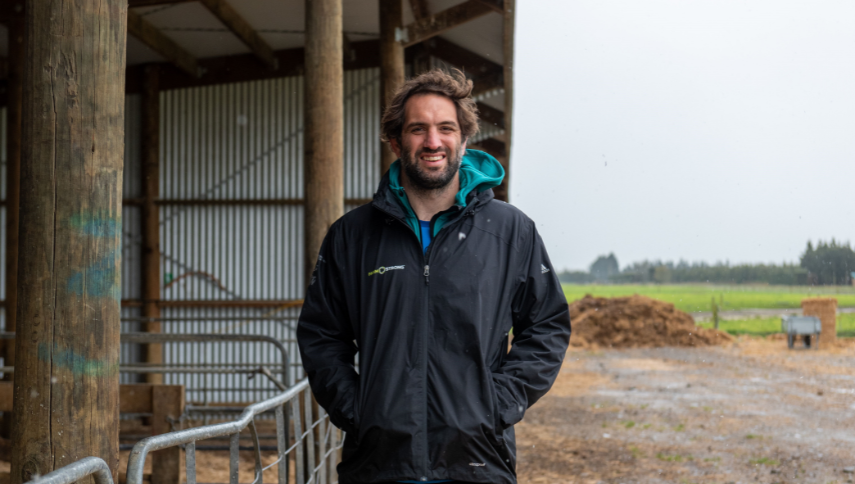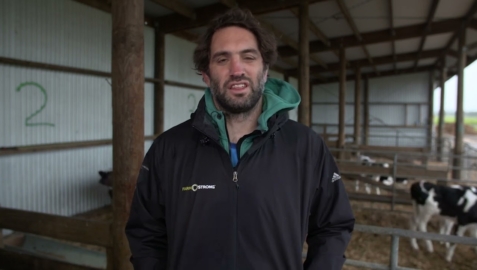
The power of small daily habits
Module Overview
Focusing on daily habits helps manage pressure when the going gets tough says Farmstrong Ambassador Sam Whitelock.
“Farmstrong was set up in 2015 to help farmers and growers cope better with the ups and downs of the industry. I’ve been its ambassador since 2016 and what I like best about the programme is that it’s so practical.
I think of Farmstrong as a verb, it’s something people can actually do to increase their wellbeing. I’ve seen first-hand how well its solutions work for rural people when they choose to adopt them.
Last year, over 17,000 attributed an increase in their wellbeing to Farmstrong. Why are farmers and growers making these changes? Because they know to get the best out of your farm or orchard, first, you need to get the best out of yourself. That’s true of any results-driven business, whether you’re a farmer or a rugby player like myself.
How Farmstrong works
Farmstrong’s all about making your wellbeing a priority in a mentally and physically demanding job. It takes a proactive, strengths-based approach to mental wellbeing and resilience by focusing on simple, daily habits and thinking strategies that are known to increase wellbeing and alleviate stress, especially during tough times.
Farmstrong is the ‘ambulance at the top of the cliff’. Our main message is one of empowerment – that as individuals and workplaces there is always something within our control that we can do to make today and tomorrow better, no matter how difficult the circumstances might be.
Free Tools and Resources
Farmstrong creates tools and resources, based on the science of wellbeing, specifically designed to help farmers and growers manage workload, stress, pressure, change, uncertainty and challenge. These resources are available for free from the Farmstrong website or on request.
There’s even a 150pp book Live Well, Farm Well that tells the stories of 29 farmers and growers who navigated challenging times and share what they did to get through. It’s a great toolkit for anyone going through a challenging time.
Investing in Wellbeing
It helps to think about your wellbeing like a bank account and make regular ‘investments’ in things that boost your wellbeing so you have something to ‘draw on’ when times are tough. A little bit like a piggy bank, the idea is to make small deposits on a regular basis rather than waiting until our wellbeing is so low that we’ve got a crisis on our hands.
The 5 Ways to Wellbeing
The best approach is to build in simple wellbeing habits into our working lives, on a daily basis. The science of wellbeing tells us that people with a strong sense of wellbeing share five simple habits – staying connected with others, keeping the body moving whether it’s yoga, gardening or playing sport, taking time each day to enjoy the simple pleasures rather than focusing on the big picture all the time, learning new things to stay fresh and giving back to their friends and community. You could tick them all off by organising one enjoyable activity a week, like coaching kids sport or catching up with your neighbours or getting off farm to go hunting or fishing or attend a community event.
I’ve made the 5 Ways part of my life and I encourage you to do the same. They definitely help to provide balance, support and a sense of perspective when the going gets tough.
Looking After The Basics
We also encourage farmers and growers to look after the basics like sleep, eating well and scheduling downtime. When people get busy these things tend to fall by the wayside, but as one farmer told us recently, no one can run a marathon on adrenalin alone. Whether you’re playing elite sport or making wine, it’s important to schedule time to mentally and physically ‘recharge the batteries’.
Shifting the dial
What the science tells us is that mental health is just like physical health. It can be good or bad. If we think about mental health as a continuum from minus five to plus five. Minus one to minus five means people are feeling stressed, anxious, depressed or not coping. That’s where most discussion usually ends and that’s what needs to change.
We need to start focusing on the positive – the zero to plus five – so we start building people’s resilience. Zero to plus five might involve activities such as adopting the 5 Ways, looking after the basics even during busy periods, exploring our mindset and learning flexible thinking strategies so people have the mental fitness to cope with change and pressure.
This approach is going to result in all sorts of benefits. The research shows people will be more productive, they’ll enjoy better business success and when they do strike challenges and setbacks, it will lessen their impact.
If more businesses and communities can start being proactive like this, we are going to have a much more sustainable and successful approach to improving mental health. Not just as businesses, but as a country.”
Farmstrong is nationwide, rural wellbeing programme. To find out what works for you and lock it in visit www.farmstrong.co.nz


